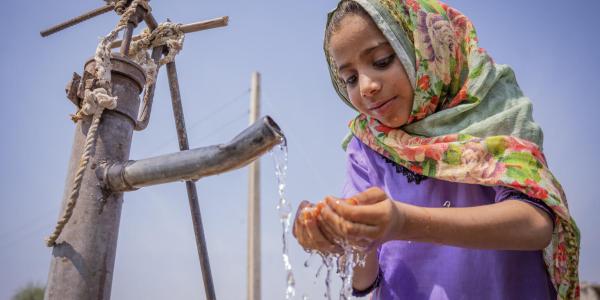
More than 10 million people, including children, still do not have access to safe drinking water six months after the devastating floods in Pakistan. As a result, families are forced to consume potentially infectious water.
Even though the country’s drinking water supply system served 92% of the population prior to the floods, only 36% of the water was considered safe for consumption. Over 5.4 million people, including 2.5 million children, were forced to rely solely on contaminated water from ponds and wells because the floods damaged most of the affected areas’ water systems.
Abdullah Fadil, the UNICEF representative in Pakistan, stated, “Safe drinking water is not a privilege; it is a fundamental human right.” However, millions of boys and girls in Pakistan are losing daily battles against preventable diseases spread by water and malnutrition. To build toilets, build safe water, and provide essential sanitation services to these children and families who require them the most, we require the ongoing support of our donors.
Waterborne diseases like cholera, diarrhea, dengue, and malaria are becoming increasingly common as a result of the prolonged absence of clean drinking water and toilets, as well as the continued proximity of vulnerable families to bodies of stagnant water. In the flood-affected regions, open defecation has also increased by more than 14%. Even worse, children, adolescent girls, and women are more likely to experience shame and harm when defecating outside because there aren’t enough restrooms.
Malnutrition is primarily caused by unsafe water and poor sanitation. Children are unable to receive the essential nutrients they require due to the associated diseases, such as diarrhea. Additionally, the already compromised immune systems of malnourished children increase their susceptibility to water-borne diseases, thereby perpetuating the vicious cycle of malnutrition and infection. Tragically, malnutrition accounts for a third of all child deaths worldwide, and infections brought on by a lack of access to clean water, adequate sanitation, and proper hygiene are linked to half of all cases of undernutrition. Malnutrition accounts for half of all child deaths in Pakistan. More than 1.5 million children in flood-affected areas are already severely malnourished, and the number will only grow if there isn’t enough clean water and sanitation.
Since the beginning of the climate-induced emergency, UNICEF and its partners have been on the ground. UNICEF set up numerous handpumps and water storage facilities right after the floods. Over the past six months, UNICEF and its partners have given hygiene kits to more than 1.3 million people and given safe drinking water to nearly 1.2 million children and families. Additionally, UNICEF supported the repair or reconstruction of water supply facilities, which benefited over 450,000 individuals.
Before World Water Day, UNICEF is urging partners, donors, and the government to urgently:
- allocate resources to restore access to safe drinking water and toilets
- invest in climate-resilient safe drinking water supply facilities and the use of renewable technologies like solar pumping systems.
Fadil stated, “It is imperative that the voices and needs of children in Pakistan are prioritized at all costs and that children are placed at the center of all plans for post-flood recovery and resilience.”
More than 9.6 million children still require access to essential social services six months after the devastating floods. Under 50% of UNICEF’s current appeal for US$173.5 million remains unfunded to assist flood-affected women and children in need of lifesaving assistance.
